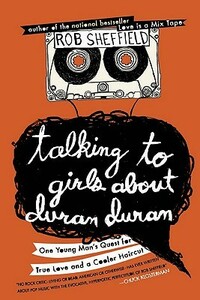Take a photo of a barcode or cover
219 reviews for:
Talking to Girls About Duran Duran: One Young Man's Quest for True Love and a Cooler Haircut
Rob Sheffield
219 reviews for:
Talking to Girls About Duran Duran: One Young Man's Quest for True Love and a Cooler Haircut
Rob Sheffield
If you loved '80's music this is the book for you. Really liked it.
funny
reflective
fast-paced
I LOVE SHEFFIELDS WRITING. This is the second of his books i’ve read and it’s sooo good. each chapter is so captivating
adventurous
emotional
funny
hopeful
informative
inspiring
lighthearted
reflective
fast-paced
so so so so good. rob sheffield is amazing. he has a way of writing about music that makes you want to put the book down and go listen to every song he mentions. he doesn't shove it in your face like "oh you would love this song!" he just talks about how much he loves it in a way that makes you want to love it like that too! i learn so much about music when i read him, and life in general. he's also super funny. this one wasn't as good as love is a mix tape, but that's only because love is a mix tape is the most bestest book in the world.
I can’t imagine anyone who didn’t grow up in the ages being interested in this book, but being one of those who did, I enjoyed it and it more often than not brought a smile to my face. This is not a book about Duran Duran, per se. This is the memoir of a writer for Rolling Stone of coming of age in the eighties and the impact of music on him and the time. Each chapter is a vignette of his life, then or now, and the impact of music on that life. Either that or it is a dissection of the music or the musicians he was listening to. Any of us can think of similar moments in our lives, connected to music. Those of us who grew up in the eighties can do it with the songs he discusses. Often I would smile just at the chapter title, for example Purple Rain, remembering the impact of that song and that album and the moments in my life when it was extremely relevant.
The problem is that, while each of the chapters is interesting in their own right, as a whole the book doesn’t add up to a cohesive story. Some chapters are more about the author, like the Prince chapter, some are more about the music or artists, like the Paul McCartney. Each are entertaining in their own right, but what is the ultimate message? That it was hard to grow up in the eighties? That music plays a big part in our lives? I’m not sure what the ultimate message is. It seems to me that the author was successful with his first book, Love is a Mix Tape, about his wife and her sudden death, and he was asked to write another. This seems to be the classic, well, what else can I tell you about myself.
This is not to say that I did not enjoy this book, I did very much. But this is because it brought me back to my youth in the eighties. As he mentioned songs and albums, they brought me back to the moments in my life that I was listening to them. Dancing with a boy to Purple Rain, rocking out in the car to Kiss (the song, not the band). I remembered stalking the record store and asking Rod what should I buy next. Having the same love affair with music that he did. One that has long mellowed. I don’t remember the last time I bought a full album, but then who does anymore? I haven’t even bought all that many singles lately. But as with Rob Sheffield, these songs defined my youth, and it is engaging to read how they defined his.
The problem is that, while each of the chapters is interesting in their own right, as a whole the book doesn’t add up to a cohesive story. Some chapters are more about the author, like the Prince chapter, some are more about the music or artists, like the Paul McCartney. Each are entertaining in their own right, but what is the ultimate message? That it was hard to grow up in the eighties? That music plays a big part in our lives? I’m not sure what the ultimate message is. It seems to me that the author was successful with his first book, Love is a Mix Tape, about his wife and her sudden death, and he was asked to write another. This seems to be the classic, well, what else can I tell you about myself.
This is not to say that I did not enjoy this book, I did very much. But this is because it brought me back to my youth in the eighties. As he mentioned songs and albums, they brought me back to the moments in my life that I was listening to them. Dancing with a boy to Purple Rain, rocking out in the car to Kiss (the song, not the band). I remembered stalking the record store and asking Rod what should I buy next. Having the same love affair with music that he did. One that has long mellowed. I don’t remember the last time I bought a full album, but then who does anymore? I haven’t even bought all that many singles lately. But as with Rob Sheffield, these songs defined my youth, and it is engaging to read how they defined his.
I liked this the least of the books I've read by Rob Sheffield. There are a few reasons for this. One is probably that since I was only born near the end of the 80s, the references aren't lost on me but still distanced from me. I didn't grow up with a lot of the music he talks about, at least not in the same way. I mean, I can sing "Hungry Like the Wolf" with the best of them, but it isn't a part of my childhood.
However, what bugged me the most about this book was how much he said stuff like "girls do x, and guys do y." He really seems to think that which genitals you have determine how you feel about music, or which bands you like, or how you think about bands, and that got on my nerves. I don't remember him doing this so much in his other books, which were admittedly less about trying to understand women.
The format is the same as his other memoirs: loosely connected vignettes framed around a certain song. Rob Sheffield is certainly the real life Rob Fleming (or Rob Gordon, if you've only seen the movie). He knows music, he loves music, he breathes music. But this book didn't do it for me in the same way as [b:Love Is a Mix Tape|46190|Love Is a Mix Tape|Rob Sheffield|https://d.gr-assets.com/books/1401023373s/46190.jpg|45332] or [b:Turn Around Bright Eyes: The Rituals of Love & Karaoke|13182465|Turn Around Bright Eyes The Rituals of Love & Karaoke|Rob Sheffield|https://d.gr-assets.com/books/1360870488s/13182465.jpg|18362878]. If I had picked this one up first, I'm not sure I would have given the others a shot.
True 80s kids will appreciate this a lot, I think, and it isn't bad. I just didn't love it after having read his other books.
However, what bugged me the most about this book was how much he said stuff like "girls do x, and guys do y." He really seems to think that which genitals you have determine how you feel about music, or which bands you like, or how you think about bands, and that got on my nerves. I don't remember him doing this so much in his other books, which were admittedly less about trying to understand women.
The format is the same as his other memoirs: loosely connected vignettes framed around a certain song. Rob Sheffield is certainly the real life Rob Fleming (or Rob Gordon, if you've only seen the movie). He knows music, he loves music, he breathes music. But this book didn't do it for me in the same way as [b:Love Is a Mix Tape|46190|Love Is a Mix Tape|Rob Sheffield|https://d.gr-assets.com/books/1401023373s/46190.jpg|45332] or [b:Turn Around Bright Eyes: The Rituals of Love & Karaoke|13182465|Turn Around Bright Eyes The Rituals of Love & Karaoke|Rob Sheffield|https://d.gr-assets.com/books/1360870488s/13182465.jpg|18362878]. If I had picked this one up first, I'm not sure I would have given the others a shot.
True 80s kids will appreciate this a lot, I think, and it isn't bad. I just didn't love it after having read his other books.
I didn't enjoy this as much as his first book. The writing felt overly self-indulgent. Much could have been cut.
Sheffield delivers, with great craft, a memoir-ish look at what it was like to be a child of the 80s. I absolutely loved this book. You're missing out if you pass this one up.
The term guilty pleasure seems to be completely lost on Rob Sheffield. That's what I loved so much about this book (as well as Love is a Mix Tape). While I wouldn't have to the nerve to admit my love of certain artists, he has no shame. It's really quite endearing. Though, I would like to discuss why he thinks Zooropa is better than The Joshua Tree. That just seems like an unforgivable sin in my book. He redeemed himself slightly by writing about the evolution of David Bowie and redeemed himself even further by comparing Paul McCartney to a bossy Irish girl. So, I suppose all is forgiven and we can agree to disagree on U2.
I assume that I would have had a greater respect for this book had I actually grown up in the 80s, but in spite of that it was still quite charming and one of those books that I will insist my friends read. Oddly enough, I did the same with Love is a Mix Tape. I suppose this officially makes me a fan.
I assume that I would have had a greater respect for this book had I actually grown up in the 80s, but in spite of that it was still quite charming and one of those books that I will insist my friends read. Oddly enough, I did the same with Love is a Mix Tape. I suppose this officially makes me a fan.
Ron Sheffield is charming and goofy and tells sweet and funny stories about girls, family, and growing up in the '80's. If you're nostalgic like me, and like to reminisce about 80's music and pop culture, you'll enjoy these stories.
And when he referred to Kenny Rogers as K-Hova I just about peed my pants.





